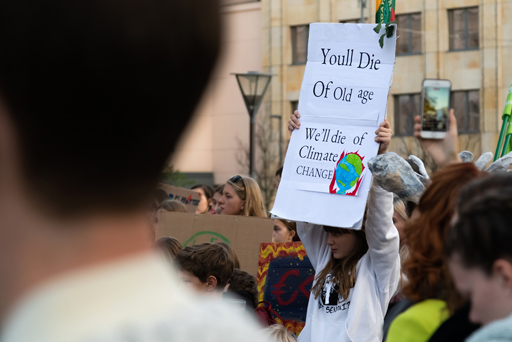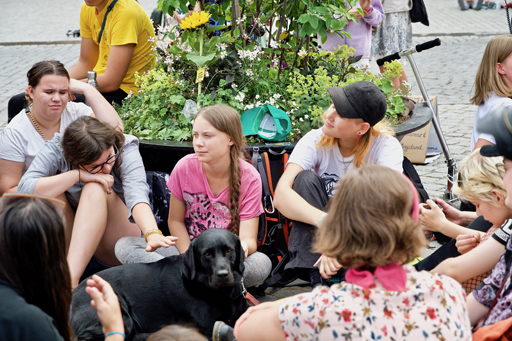3 Climate justice for the next generation
Climate change is something that affects different people in different ways. Those living in countries close to sea level, for example, will be affected differently to those in cities. It is estimated that approximately 190 million people currently live in areas that are expected to be under high tide levels by 2100. This will cause massive displacements of populations, and nations like Tuvalu or the Maldives could disappear altogether (Osterloff, 2020). For those in cities, temperature change could make living there unbearable and those who are poor and cannot afford air conditioning, or who live in substandard or poorly ventilated houses, will suffer health problems from the heat.
Climate change does not affect everyone equally therefore and, as suggested in the previous section, it both illuminates and increases inequality and injustice. For this reason, many protestors prefer not to talk about the need to combat climate change but about the need to ensure climate justice. In using this term, activists frame global warming and climate change in terms of human rights and emphasise the critical point that those who are least responsible for climate change – including children – are the ones who suffer its most significant consequences. In order to examine the ideas of social justice and intergenerational inequality more fully, firstly it is important to define these terms.
According to Mary Robinson, the Former Irish president, the notion of climate justice:
insists on a shift from a discourse on greenhouse gases and melting ice caps into a civil rights movement with the people and communities most vulnerable to climate impacts at its heart. Now, thanks to the recent marches, strikes and protests by hundreds of thousands of schoolchildren, we have begun to understand the intergenerational injustice of climate change.
(Quoted in United Nations, 2019)
Robinson has also stressed the importance of intergenerational partnerships where young people are seen as ‘means of implementation’ and ‘creators of opportunities’ and not just beneficiaries.
Such a shift in thinking has led to children and young people becoming activists and political leaders. No longer prepared to be only passive or mute symbols of the future, children and young people are now campaigning for climate justice for their own and future generations. Rather than waiting passively for adults to ensure their rights to protection and provision, children and young people are taking their rights to participation seriously (discussed in Section 1) and demanding to be included in and consulted about decisions which affect them.
High profile campaigners such as Alexandria Villasenor in the USA or Aditya Mukarji in India have become important and listened-to campaigners urging governments to take the crisis seriously, organising school strikes and starting campaigns to limit plastic waste (Unigwe, 2019).
Most famous of all campaigners is Swedish activist Greta Thunberg. In 2019, the then 16-year-old addressed the climate summit at the United Nations in New York and demanded that climate change be seen specifically as a children’s problem and as an infringement of their rights. She denounced the leaders in the room:
This is all wrong. I shouldn’t be up here. I should be back in school on the other side of the ocean. Yet you all come to us young people for hope. How dare you! You have stolen my dreams and my childhood with your empty words. And yet I’m one of the lucky ones. People are suffering. People are dying. Entire ecosystems are collapsing. We are in the beginning of a mass extinction, and all you can talk about is money and fairy tales of eternal economic growth. How dare you! ...You are failing us. But the young people are starting to understand your betrayal. The eyes of all future generations are upon you. And if you choose to fail us, I say: We will never forgive you.
(Thunberg, 2019)
A few hours after making this speech, Thunberg and 14 other young activists attempted to persuade the United Nations to classify the climate crisis as a children’s rights crisis. They did this by filing a lawsuit suing five of the world’s major carbon polluters – Argentina, Brazil, France, Germany, and Turkey – for failing to uphold their rights under the United Nations Convention on the Rights of the Child.


